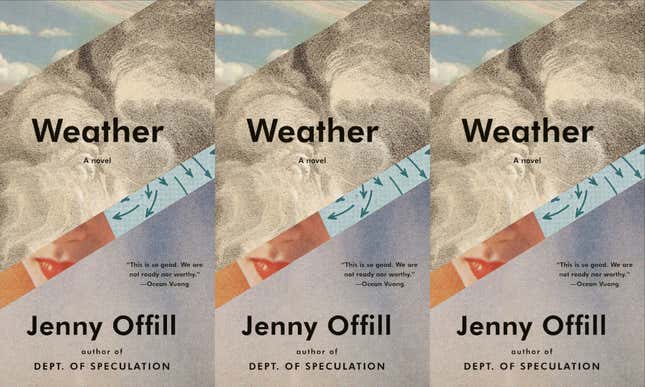Imagining Disaster
In Depth

“Everyone I know is trying to sleep less,” says the narrator of Jenny Offill’s new book Weather. “Insomnia as a badge of honor. Proof that you are paying attention.” Attention is at the heart of Offill’s latest novel composed of fragmented, epigrammatic writing, but it is often presented in a conflicted, anxious form.
Offill’s protagonist Lizzie works as a librarian and lives with her husband, young son Eli, and dog. She is close to her brother, who has issues with addiction, and soothes her retired mother over the phone. Lizzie worries that when she has a pain in her knee it might be cancer; her child worries about being left alone at school. Early on in the book, Lizzie receives a newsletter from her son’s old preschool which lists the fears of the children that attend it: “Darkness doesn’t make the cut. Blood, sharks, and loneliness are 8, 9, and 10.” Lizzie’s fears are a little more abstruse: “My #1 fear is acceleration of days. No such thing supposedly, but I swear I can feel it.” As she takes on work for her friend and mentor Sylvia, answering the emails sent in by listeners to Sylvia’s podcast Hell or High Water, a show that seems to be about the end-times, she starts to hear from worried and anxious people. Lizzie’s fear about the future starts to look different, and she begins to frequent prepper websites, which offer tips on how to prepare for the waves of catastrophes that will befall the warming world. People with bunkers and stockpiled canned goods used to look paranoid; now it seems, at least to Lizzie, that they might have the right idea.
The book is composed of several short paragraphs, made up of jokes, advice, anecdotes, quotes, questions, and answers. Though it is written from the first-person perspective, Weather is curiously choral in places, borrowing quotes from speeches, poems and elsewhere. Like Offill’s previous novel, 2014’s enormously successful Dept. of Speculation, there is something spare here, suggesting that much has been whittled away. These fragments also give a sense of the way that we receive information, and how we might experience fleeting moments of panic or doom. It’s hard to join each section together to suggest a fluid narrative; just as we might have absorbed one idea, the novel skips ahead to another. This peppering of information replicates the uniquely piecemeal way we receive news. What might be described as a kind of apathy in the face of the enormity of climate change, may even turn to irritation or dismissal: “Environmentalists are so dreary,” says Lizzie at one point. Do we persevere with reading and learning about the various crises of climate change, or do we throw our hands up in the air in resignation?
Offill admits, in an interview with The Guardian, that her research for Weather was born out of her lack of interest in the subject. This struggle to come to terms with the issue is present in the novel, through the dominant questions it poses: What does it mean to familiarize yourself with knowledge that makes you worried, anxious, and scared? Are there limits to what we can handle? In recent months, headlines have been dominated by news of a deadly pandemic and storms and wildfires from around the world, but the responses by some politicians and public figures often seem superficial and worryingly simplistic, if not entirely dismissive. At the UN Climate Change Conference in February 2020, Conservative prime minister Boris Johnson pledged to commit to a net-zero carbon emission for the United Kingdom by 2050 and pledged around $136 billion to tackle climate change, but he heads a party that has consistently cut funding for alternative energy sources, as well as giving tax breaks to large polluting companies. Even multi-billionaires are getting on board, with Jeff Bezos donating $10 billion to “climate change causes” while simultaneously utilizing punitive and exploitative employment practices for over half a million employees. Donald Trump’s position on climate change is difficult to ascertain, ranging from him decrying it as a Chinese conspiracy, to describing it, in more recent times, as a “serious” subject that is “important” to him. How do we situate ourselves amongst these wildly different approaches and positions?
-

-

-

-

-

-

-

-

-

-

-

-

-

-

-

-

-

-

-

-

-

-

-

-

-

-

-

-

-

-

-

-

-

-

-

-

-

-

-

-








































